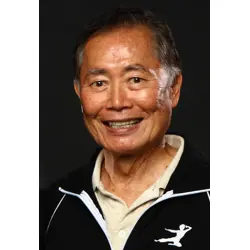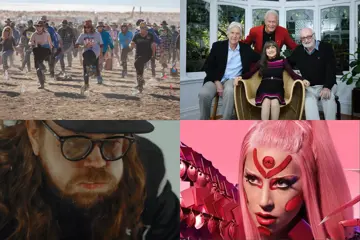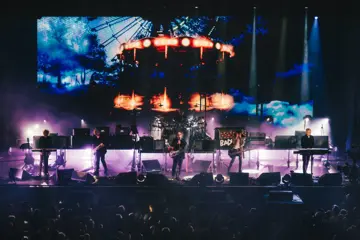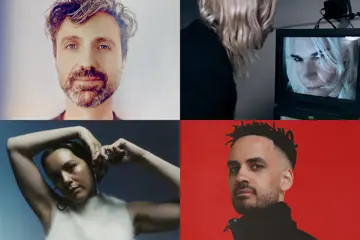 George Takei
George TakeiGeorge Takei is not feeling well.
The veteran actor, political activist and beloved social media star has just returned from a three-week college speaking tour of, in his words, the “bone-chilling” regions of the United States, during which he contracted the dreaded lurgy while in the below-zero confines of Minneapolis, Minnesota. But, despite his ailment, when The Music makes contact with the Star Trek legend ahead of his journey Down Under for next month’s Supanova Pop Culture Expo, he’s every bit the class act his storied career would lead one to believe he is.
“I have this hideous cold, and I should warn you, I get unanticipated, sudden attacks of coughing jag, so please bear with me on that,” Takei cautions politely. “All the places I went to were the bone-chilling places — they all reached below zero at one point or the other … So I’m not feeling good.”
This fact wouldn’t be evident to the casual observer, however, as Takei proves to be in an affable, chatty mood, his spirits seemingly in good shape — if not his immune system — ahead of his maiden appearance at the popular convention. Despite this being his first showing at Supanova, Takei’s no stranger to Australian shores; he made a World War II-era film on the Gold Coast in 1990 with Bryan Brown titled Blood Oath, and has otherwise visited the country “many, many times, for work as well as pleasure as well as Star Trek conventioneering”, coming to know the cities of Sydney, Melbourne and Brisbane “quite well”.
And, of course, there was his experience on the UK version of I’m A Celebrity, Get Me Out Of Here (2008), which — if you’ve seen it — may go a long way towards explaining his seemingly effortlessly stoic disposition in the face of his illness during this interview.
Don't miss a beat with our FREE daily newsletter
“I was in the rainforest of Queensland for a whole month doing a British reality show called I’m A Celebrity, Get Me Out Of Here, and it was a very trying experience,” Takei recounts. “I love the creature comforts, and living in a damp, wet rainforest — well, that’s why it’s a rainforest, I suppose — and with interesting people, mind you... but very physically uncomfortable.
“The worst part of it was what they called the ‘dunny’ — the latrine — was a quarter of a mile away, and I believe in hydrating all day long, so I had to make that dash in the middle of the night, wearing my boots because there’s that thick underbrush, and once I could not quite make it; I hid behind a huge palm leaf and answered mother nature’s call. But they have cameras all over that jungle, and I was caught [laughs].
“There were people that were on the verge of hysteria, but I believe in — well, there’s that British saying, I think it came from the Second World War… how does it go?… ‘stay calm and carry on’. And I believe in that. Stay calm and carry on. Soldier through. It was a difficult experience but nevertheless… so therefore, I didn’t do too badly.”
In doing his best to stave off the hardships of the Australian rainforest during the course of the show — Takei came third overall — he demonstrated mastery of mind over matter in a manner that most suburban-born city dwellers that actually live here couldn’t dream to muster, divulging in detail the mental tricks he used to overcome the worst that this great southern land had to throw at him.
“So much is how you approach something. For example, one of my challenges was to eat all sorts of grotesque things, and they don’t tell you what it is until they uncover it,” Takei explains. “First was a box full of cockroaches, and I was supposed to eat five of them.
I had kangaroo penis, which was absolutely tasteless. It was like chewing on saddle leather.
“Now, first of all, you have to catch them, and my approach was, ‘Oh, these are supposed to be toasty and crunchy,’ so I caught them and put them in my mouth thinking, ‘It’s peanuts,’ and there is a kind of nut-like taste to it; the same crunch. And then I had… what was it?… grub worms. And that was difficult, as calmly as I tried to approach it. They told me to bite off the head first … so I did as they instructed me, I bit the head and spat it out, and I looked at the body, and the yellow innards were oozing out. So I tossed it in very quickly to my mouth, and chewed it and swallowed it; it was a ghastly taste. But the worst part of it — excuse me… thoughts of grub worms upsetting my stomach [laughs] — the worst part of it was, a minute or two later, you get an after-taste. This taste comes welling up in your mouth again.
“Oh, and all sorts of things like that; I had kangaroo penis, which was absolutely tasteless,” he continues. “It was like chewing on saddle leather, you know, you just chew and chew, and it won’t break apart. I chewed for five minutes, and I knew it was terrible television — it’s the most boring thing to see a person chewing away — they told me to take it out and tear at it with my carnivore teeth and break it down, and so I did, and I was able to swallow a portion of that."
“So all those things — it’s a matter of how you look at it, how you approach it,” he says, as if anybody has moved past the mental image of unchewable ‘roo junk yet. “If you look at it as, ‘Ooh, that’s icky,’ or, ‘Ooh, that’s grotesque,’… it’s in the approach, and psychologically you can make things that may otherwise — well, of course, I’m Japanese, and I love sushi, something that some people can’t eat, and that’s because of the idea, you know — they think, ‘Ooh, raw fish?’, and then I tell them, ‘Well, you eat dead cow, don’t you?’”
While his impending trip to Australia should hopefully be far less trying than that little visit, there is, at its core, another harrowing experience fuelling the forthcoming journey's importance; not just for Star Trek or the fact that he’s become Facebook’s poster boy for awesome celebrities doing tangible social good — he has more than 8 million followers on the platform — there is what Takei calls his ‘legacy project’. And it’s important to understand that, were it not for this exact work, a musical called Allegiance, which details the indignities and outrages inflicted upon Japanese American citizens following the attack on Pearl Harbour — including imprisonment, which the young Takei and his family endured — there wouldn’t have been an internet following to begin with.
Speeches and museum exhibits hit the mind, the brain, but I wanted to humanise that story.
“Well, five years ago, I had a very small base — they were Star Trek geeks and nerds,” Takei recalls. “I decided to do my Facebook and Twitter campaign primarily because I was developing what I call my legacy project. It’s still not too well known, but, after Pearl Harbour, Japanese Americans — American citizens of Japanese ancestry here in the United States — were summarily rounded up and imprisoned in barbed-wire prison camps in some of the most hellish places in this country.
“[Raising awareness of Japanese American treatment after Pearl Harbour] has been my mission in life. In fact, the college speaking tour that I came back from was on that subject, and we founded a museum called the Japanese American National Museum, which is an affiliate of the Smithsonian now, to tell that story. But speeches and museum exhibits hit the mind, the brain, but I wanted to humanise that story, and so we’ve been developing a musical. We found a wonderfully gifted composer/lyricist, and we developed a musical titled Allegiance. But, because the story is still little-known, we had to educate, raise the awareness of the American public on that subject, and then let them know that we had this musical on it.
“So, by trial and error, I discovered that humour is the thing that gets the most likes and shares, and so I started using a lot of humour, and particularly Grumpy Cat, and the fan following just exploded. Then I started injecting some social justice issues, and it exploded some more, and via that we built an audience for what we call our world premiere in San Diego. The New Yorker still calls it ‘the out-of-town tryout’ — the arrogant New Yorker [laughs] — and so it was to build an audience for Allegiance that I started my social media campaign, and now this Fall we’re going to be opening on Broadway, so I’ll be making my Broadway debut at age 78, and we’re absolutely thrilled about it. Mission accomplished! We haven’t opened yet, but we’re getting very close to it.”
A septuagenarian making his debut performance on Broadway is unquestionably an achievement unto itself, but similarly impressive is the shrewd and savvy manner in which Takei has used social media to his advantage, staying tapped into the ever-shifting zeitgeist of meme culture to ensure his message is seen by as many people as possible, always adapting to new ways to embrace new developments.
“The memes I share are the memes that my fans send me,” he says. “It’s a sharing medium — social media. I don’t take the ‘me’ in ‘media’ as the core. I take the ‘social’ part of that as what social media’s all about. So I reshare what the fans send me, so I get a diverse range of humour. Some might be linguistically structured humour, others might be a little bawdy [laughs], and others might be animals. Animals can be the funniest creatures!”
What’s exciting about technological advance is we’ve gone far past Star Trek … we've gone zillions of miles past what our Communicator was.
It’s perhaps a little unsurprising that Takei has so eagerly thrown himself behind 21st-century technology, given Sulu and the Enterprise crew were rocking 23rd-century fashion when colour TV was a recent invention — and there has been a long-touted relationship between the simultaneously predictive and influential nature of Star Trek’s technology on our own; yet Takei believes that real life has, in fact, far outstripped the United Federation Of Planets’ futuristic gadgets.
“What’s exciting about technological advance is we’ve gone far past Star Trek, because on Star Trek we had — then — an amazing device that we wore on our hip that we walked around the ship with, and whenever we wanted to talk to someone, we’d rip it off and flip it open and we’d start talking,” Takei enthuses. “The fact that the talking device had no cords attached to it was astounding. But, today, not only do we talk on it, we send text messages on it, we watch movies on it, we take pictures from it… we’ve gone zillions of miles past what our Communicator was.
“And, in many ways, Star Trek has served as a stimulus for people to start working on some of the devices that we had. We’re far from it now, but I read in the papers the other day that we have moved a molecule a fraction — and that’s the beginning of the Transporter. You know, Dr McCoy hated it, getting his molecules all separated and flashed over some place else but that may be another way of travelling, and I, as a regular traveller — every third day, I’m in an airport — I devoutly pray for the early invention of the Transporter, where we can just sparkle and pop out and, a few seconds later, sparkle and pop in at our destination. No delayed flights, no lost luggage, no cancelled flights...[laughs].”
But it’s not the far-off time of Star Trek’s adventures for which Takei ultimately wants to be remembered – it’s Allegiance, and the boosted attention paid to the plight of Japanese Americans during World War II that arises from its existence when he and its crew head to New York for what Takei hopes will be “a very, very long time”. And Allegiance — his legacy project — truly is the sum of Takei’s life works, passions and interests, from the progressive nature of his role on Trek to his forays into politics in the late 20th century (“Well, I guess … I have a chequered past,” he quips) and devotion to his cause that stirred within him during his adolescence.
It was from my father – a man who lost everything, in the middle of his life business, home, freedom, and had to suffer all the indignities and outrages [inflicted on] innocent people, simply because of our faces, to be imprisoned like that… my father explained to me that our democracy is a people’s democracy.
“From the time I was in my late teens, I’ve been active in the political arena, primarily because — you know, I was a child when I was incarcerated, and I really didn’t understand what that was all about,” he explains. “So, as a teenager, I looked in history books and I couldn’t find anything about it; I read civics books and I read about the shining ideals of our democracy, and I couldn’t reconcile that with what I knew to be my childhood imprisonment.
“So I engaged my father in many, many after-dinner conversations, and it was from my father — a man who lost everything, in the middle of his life business, home, freedom, and had to suffer all the indignities and outrages [inflicted on] innocent people, simply because of our faces, to be imprisoned like that… my father explained to me that our democracy is a people’s democracy, and he said it can be as great as a people can be, but it’s also as fallible as people are. Our democracy is vitally dependent on good people who cherish the ideals of our democracy: All men are created equal in God with an inalienable right to life, liberty and the pursuit of happiness, and so we have to be actively engaged in people’s democracy to prevent something like our imprisonment, which was caused by racism and hysteria.
“Then he took me downtown to the Adlai Stevenson For President headquarters. Adlai Stevenson was a greatly successful governor of Illinois who ran for President — three times, as a matter of fact, and lost to Eisenhower — but my father was an admirer of Adlai Stevenson, and he took me to that headquarters and I understood how our democracy works. And it was also a lot of fun, working with a lot of passionate people that are committed to the ideals. So I’ve been involved in political campaigns as well as social justice campaigns from the time I was in my late teens, throughout my life.”
Takei was also involved with one of the Tom Bradley For Mayor Of Los Angeles campaigns — “a great mayor … the only African-American who was elected mayor of Los Angeles, and … the only mayor of Los Angeles who served five times” — and ran for public office himself (“a lot of fun [ but] it was exhausting … the kind of exhaustion that I enjoy”), and even admits himself to be a supporter of Hillary Clinton, but at the end of the day he has no plans to return to the political arena in a full-time, professional capacity, preferring instead to remain focused on Allegiance’s impending unveiling and, hopefully, cementation as the reason Takei was put on Earth, via his extended journeys among the stars.
“I love my career, and I’ve been able to develop this musical that is going to be, as I tell people, my legacy project, and so my primary thrust in this portion of my life is to make Allegiance a great American hit,” he says.
May it live long and prosper.















